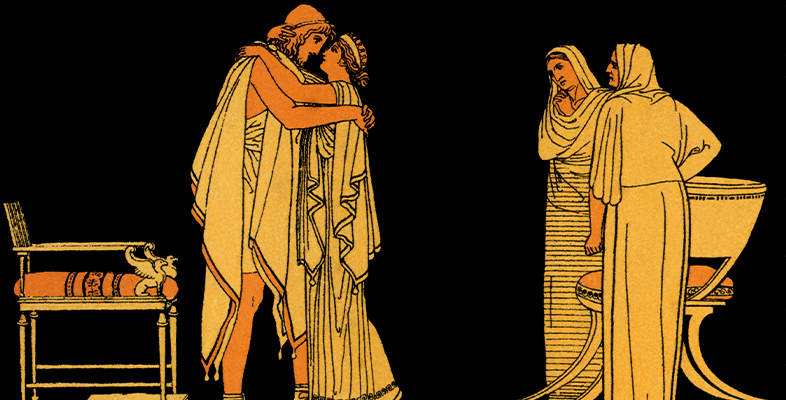Odysseus: The Cunning Hero of Greek Mythology
The story of Odysseus, the legendary Greek king of Ithaca, is one of the most enduring tales from ancient mythology. Known for his intelligence, resourcefulness, and resilience, Odysseus is the central figure in Homer's epic poem, *The Odyssey*, which chronicles his long and arduous journey home after the fall of Troy. His adventures have captivated audiences for centuries, offering profound insights into human nature, the challenges of leadership, and the struggle against fate.
The Origins of Odysseus
Odysseus was the son of Laertes, the king of Ithaca, and Anticlea, daughter of Autolycus—a notorious trickster favored by the god Hermes. From birth, Odysseus was destined for greatness, inheriting his grandfather's cunning nature and his father's royal legacy. He grew up under the mentorship of the centaur Chiron, like many Greek heroes, mastering skills in combat, strategy, and diplomacy.
Odysseus married Penelope, a woman renowned for her beauty and wisdom, and they had a son, Telemachus. However, their peaceful life was interrupted when Helen of Sparta, the wife of Menelaus, was abducted by Paris, the Trojan prince. Bound by the Oath of Tyndareus, which required all former suitors of Helen to defend her marriage, Odysseus was compelled to join the Achaean forces in the Trojan War—though he initially tried to avoid it by feigning madness.
The Trojan War and the Ingenuity of Odysseus
During the decade-long Trojan War, Odysseus proved indispensable to the Greek victory. His sharp mind and strategic brilliance earned him the favor of Athena, the goddess of wisdom and warfare. One of his most famous contributions was the conception of the Trojan Horse, a deceptive ploy that ultimately led to Troy's downfall. Disguised as a peace offering, the hollow wooden horse concealed Greek soldiers, who infiltrated the city under cover of night, allowing the Greek armies to sack Troy.
Odysseus’ leadership was not without controversy, however. His tendency toward trickery sometimes bordered on ruthlessness, particularly in his treatment of Palamedes, a fellow Greek who exposed Odysseus’ earlier attempt to evade the war. Later, Odysseus framed Palamedes for treason, leading to his execution—an early example of the moral ambiguities that would define his character.
The Odyssey Begins: A Perilous Journey Home
After the fall of Troy, Odysseus and his men set sail for Ithaca—an ordinary voyage that should have taken weeks turned into a ten-year ordeal. The gods, particularly Poseidon, cursed Odysseus for his arrogance and blinded Polyphemus, the Cyclops and son of Poseidon. This act incurred the sea god’s wrath, ensuring that Odysseus would face relentless trials before reaching home.
His journey took him through uncharted waters filled with mythical creatures, divine interventions, and impossible choices. Among his most famous encounters were:
The Lotus-Eaters
When Odysseus’ crew landed on the island of the Lotus-Eaters, they were offered the intoxicating lotus fruit, which caused them to forget their homeland and desire only to linger in blissful apathy. Recognizing the danger, Odysseus dragged his men back to the ships, forcing them to continue their voyage—a testament to his determination and leadership.
The Cyclops Polyphemus
In one of his most famous exploits, Odysseus and his men were trapped in the cave of Polyphemus, a savage Cyclops. After the monster devoured several of his crew, Odysseus devised a plan to blind Polyphemus with a burning stake and escape by hiding under the Cyclops’ sheep. However, his hubris led him to reveal his true name as he sailed away, prompting Polyphemus to call upon his father, Poseidon, to curse Odysseus.
Aeolus and the Bag of Winds
Odysseus received a bag of favorable winds from Aeolus, keeper of the winds, to speed his journey home. However, his suspicious crew opened the bag, unleashing storms that blew them far off course—another example of human folly undermining Odysseus’ efforts.
Odysseus’ Trials and Temptations
Odysseus faced numerous temptations that tested his fidelity and resolve. The sorceress Circe turned his men into swine, but with the help of Hermes, Odysseus resisted her magic and freed his crew. Later, he navigated past the deadly Sirens, whose enchanting songs lured sailors to their doom. Following Circe’s advice, he ordered his men to plug their ears with wax and tied himself to the mast so he could hear their song without succumbing.
Another challenge came in the form of Scylla and Charybdis—two monsters guarding a narrow strait. Forced to choose between losing men to Scylla’s six heads or risking the entire ship in Charybdis’ whirlpool, Odysseus chose the former, sacrificing a few to save the majority.
Perhaps the greatest temptation was the nymph Calypso, who offered him immortality if he stayed with her on her island. Though he lingered for seven years, Odysseus ultimately rejected eternal life, yearning instead for his home and family.
The Themes of The Odyssey
Odysseus’ journey is more than a series of adventures; it symbolizes the human struggle against adversity, the consequences of pride, and the power of perseverance. His intelligence, or *metis*, contrasts with brute strength, emphasizing the value of wit over raw power.
Moreover, *The Odyssey* explores themes of *nostos* (the longing for home), *xenia* (the sacred laws of hospitality), and divine justice. The gods frequently intervene, rewarding piety or punishing arrogance, while mortal characters face moral dilemmas that reveal their true nature.
With every trial, Odysseus inches closer to Ithaca, but his greatest challenge—reclaiming his throne from the suitors who have overrun his palace—still awaits. The second part of his story will delve into his return, disguise, and ultimate vengeance against those who sought to take his kingdom and wife.
The Return to Ithaca: Odysseus’ Reckoning
After enduring countless trials and spending years longing for home, Odysseus finally arrived in Ithaca—only to find his kingdom in disarray. In his absence, over a hundred suitors had invaded his palace, consuming his wealth, pressuring his wife Penelope to remarry, and plotting against his son Telemachus. Disguised as a beggar by Athena, Odysseus moved in secret, assessing the situation and plotting his revenge.
The Disguise and Reconnaissance
Athena transformed Odysseus into an elderly, ragged beggar, allowing him to walk unnoticed through Ithaca. He reunited first with his loyal swineherd, Eumaeus, who unknowingly sheltered his king. Meanwhile, Telemachus, who had grown into a young man searching for news of his father, returned from his own journey guided by Athena. With divine intervention, father and son were reunited, and together they devised a plan to reclaim the palace.
Odysseus maintained his disguise even when facing insults and abuse from the suitors, showcasing his restraint and cunning. Only his aging dog, Argos, recognized him before collapsing in contentment—an emotional moment underscoring the decades Odysseus had lost.
Penelope’s Test of the Bow
Penelope, still faithful to Odysseus despite years of pressure, announced a contest: she would marry whoever could string Odysseus’ legendary bow and shoot an arrow through twelve axe heads—a task only Odysseus had ever accomplished. The suitors, though arrogant and boastful, failed miserably. Odysseus, still disguised, then stepped forward. Though mocked, he effortlessly strung the bow and completed the challenge, signaling his return.
The Slaughter of the Suitors
With the suitors stunned, Odysseus revealed his true identity. What followed was a merciless, bloody retribution. Armed with the bow and aided by Telemachus, Eumaeus, and another loyal servant, Philoetius, Odysseus unleashed his vengeance. The hall became a slaughterhouse as he systematically killed every suitor who had dishonored his home, sparing only the bard and herald, who were deemed innocent.
The brutality of this massacre has been debated for centuries—was Odysseus justified, or was this an act of excessive violence? His actions may seem extreme by modern standards, but in the context of ancient Greek honor culture, avenging such dishonor was not just expected but necessary to restore order.
Reunion with Penelope
After the bloodshed, Odysseus faced one final test—proving himself to Penelope. Though overjoyed at her husband’s return, she hesitated, wary of deceit. To ensure this was truly Odysseus, she ordered their bed to be moved—a clever ruse, as Odysseus had built their marriage bed around a living olive tree, making it immovable. When Odysseus reacted with outrage to her request, Penelope knew it was him. Their emotional reunion marked the restoration of their family and kingdom.
The Aftermath: Peace and Divine Reconciliation
Despite reclaiming Ithaca, Odysseus’ trials were not yet over. The families of the slain suitors demanded justice, forcing Odysseus into exile as part of a prophecy. Alternatively, some versions of the myth suggest Athena intervened to broker peace. Regardless, Odysseus eventually reconciled with Poseidon, fulfilling his final divine obligation by carrying an oar inland until someone mistook it for a winnowing fan—signifying his atonement for blinding Polyphemus.
Odysseus’ Legacy and Interpretations
Odysseus’ story transcends simple heroism. Unlike traditional Greek heroes like Achilles or Heracles, he embodied intellect above brute strength. His journey posed timeless questions about leadership, suffering, and the human condition. Was he a hero, a trickster, or a flawed man struggling against fate?
Philosophical and Literary Impact
From ancient playwrights like Sophocles to modern authors like James Joyce (*Ulysses*), Odysseus’ tale has been reinterpreted endlessly. Philosophers admire his resilience (Nietzsche’s *will to power*) while psychologists analyze his deception tactics (the "Odyssean" personality). His name even became synonymous with long, fraught journeys—an "odyssey."
Historical and Archaeological Connections
Scholars debate whether Odysseus was based on a real Mycenaean warlord or purely mythical. Striking parallels exist between his adventures and Bronze Age seafaring dangers, like the whirlpool Charybdis mirroring Sicily’s Strait of Messina. Excavations in Ithaca reveal a palace matching Homer’s descriptions, but conclusive proof remains elusive.
Odysseus’ End: The Lost Epilogue
While *The Odyssey* concludes with peace in Ithaca, later traditions hint at Odysseus’ death. One legend claims Telegonus, his son with Circe, accidentally killed him with a poisoned spear. Another says he died quietly in old age, far from the sea. Either ending underscores his tragic heroism—a man who survived gods and monsters but could not escape mortality.
His final fate, however, matters less than the lessons of his journey. Odysseus teaches us about adaptability (“the man of twists and turns”), the cost of pride (*hubris* versus *metis*), and the unbreakable pull of home (*nostos*).
The Cultural Evolution of Odysseus: From Ancient Myth to Modern Symbol
Odysseus’ influence did not end with ancient Greece. Over the centuries, his legend has evolved, adapting to reflect the values and anxieties of different cultures. From Roman poets to Renaissance painters, and from 20th-century novels to Hollywood films, his journey remains a universal template for human struggle, reinvention, and the search for meaning.
Odysseus in Roman and Medieval Tradition
The Romans, who absorbed much of Greek mythology into their own, reimagined Odysseus as Ulysses. Virgil’s *Aeneid* casts him as a cunning but treacherous figure responsible for Troy’s destruction—fitting for a narrative that glorified Rome’s supposed Trojan ancestors. Later, Dante Alighieri consigned Ulysses to the eighth circle of Hell in *Inferno* for his deceptive schemes, particularly the Trojan Horse. Yet Dante also immortalized his restless spirit in a haunting speech about voyaging beyond the known world: "You were not made to live as brutes, but to follow virtue and knowledge."
In medieval Europe, Odysseus became a symbol of both warning and admiration. Christian writers condemned his pride but praised his endurance as a pilgrim navigating life’s trials. The *Odyssey* itself survived through fragments and translations, preserving his legacy even when Greek culture was overshadowed.
The Renaissance and Enlightenment: Odysseus Humanized
Revivals of classical learning during the Renaissance restored Odysseus as a complex hero. Artists like Pinturicchio painted him as an embodiment of wisdom, while playwrights explored his psychological depth. Shakespeare echoed Odyssean themes in *The Tempest*, where Prospero—a stranded ruler using guile to reclaim his throne—mirrors Ithaca’s king.
By the Enlightenment, philosophers like Goethe saw Odysseus as a prototype of the self-made individual. His reliance on reason over brute force resonated with an age celebrating human intellect. Even his flaws—hubris, deceit—made him more relatable, a man navigating moral ambiguity rather than a flawless demigod.
Odysseus in Modern Literature and Psychology
The 20th century witnessed an explosion of interest in Odysseus as a literary and psychological archetype. James Joyce’s *Ulysses* recreated his journey as a single day in Dublin, framing ordinary man Leopold Bloom as a modern Odysseus confronting alienation, identity, and love. Meanwhile, Nikos Kazantzakis’ *The Odyssey: A Modern Sequel* stretched Homer’s tale into an existential epic, sending Odysseus on a new voyage seeking spiritual truth.
The “Odyssean” Personality
Psychologists coined the term “Odyssean” to describe individuals who thrive through adaptability and problem-solving. His traits—resilience, strategic thinking, and emotional regulation—are now studied as keys to surviving adversity. Likewise, myths like the Sirens or Lotus-Eaters are invoked to discuss addiction, distraction, and the perils of complacency.
Freud and the Oedipus Complex Contrast
Where Freud’s Oedipus symbolized unconscious familial conflict, Odysseus represented conscious endurance. His loyalty to Penelope (despite temptations) and mentorship of Telemachus countered Freudian fatalism, offering an alternative model of psychological maturity.
Odysseus in Popular Culture
From films to video games, Odysseus’ name is shorthand for clever heroes on impossible quests. Major adaptations include:
Film and Television
- *O Brother, Where Art Thou?* (2000) – The Coen Brothers’ Depression-era retelling casts Odysseus as escaped convict Ulysses Everett McGill, blending Homeric episodes with Americana.
- *Troy* (2004) – Though focused on Achilles, Brad Pitt’s Hector quotes Odysseus’ warning: "War is young men dying and old men talking."
- *Odysseus: Voyage to the Underworld* (2008) – This miniseries amplifies supernatural elements, depicting his encounters with Hades and lost comrades.
Video Games and Comics
- *Assassin’s Creed Odyssey* (2018) – Players explore Greek mythology as a mercenary linked to Odysseus’ legacy.
- *Marvel Comics* – Odinson (Thor) references Odysseus in story arcs about exile and redemption.
The Feminist Critique: Reexamining Penelope and the Monsters
Modern scholars often deconstruct Odysseus’ myth through feminist and postcolonial lenses. Penelope, once a passive symbol of fidelity, is now celebrated for her quiet resistance. Weavers like Margaret Atwood (*The Penelopiad*) retell her story, highlighting the suitors’ brutality and the cost of patriarchal expectations.
Similarly, monsters like Scylla and Charybdis or Calypso are reinterpreted as manifestations of male fears—feminine power unconstrained by male control. Even Circe, who turned men into swine, is recast as a witch reclaiming agency in Madeline Miller’s novel *Circe*.
Odysseus’ Relevance Today
Why does Odysseus endure? Because his struggles mirror our own: navigating misinformation (the Sirens’ false promises), resisting escapism (the Lotus-Eaters), and balancing ambition with homecoming. In an era of displacement—refugees, pandemics, digital nomadism—his *nostos* feels achingly contemporary.
Leadership Lessons from Odysseus
- Adaptability: His survival depended on pivoting strategies, from fighting Cyclopes to negotiating with ghosts.
- Empathy: He wept for fallen comrades, showing vulnerability atypical of ancient heroes.
- Legacy: His mentorship of Telemachus underscores that rulers must nurture successors.
Conclusion: The Eternal Voyager
Odysseus’ journey never truly ends. Each generation rediscovers him, whether as a cautionary figure, a cultural icon, or a mirror for humanity’s restless spirit. His name no longer belongs to Greece alone but to the world—a testament to the power of storytelling to transcend time. As long as we face storms, seek home, or wrestle with our demons, Odysseus sails on.
Final Words
In the words of poet Alfred, Lord Tennyson’s *Ulysses "To strive, to seek, to find, and not to yield." Odysseus’ myth is a compass pointing not just to Ithaca, but to the uncharted waters within us all.





















Comments